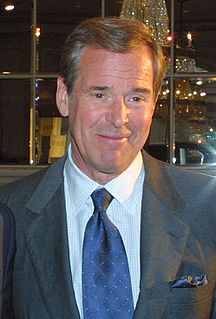A Quote by Dalai Lama
An important distinction can be made between religion and spirituality. Religion [is] concerned with faith in the claims to salvation of one faith tradition... Spirituality is concerned with qualities of the human spirit, love and compassion, patience, tolerance, forgiveness, contentment, a sense of responsibility, a sense of harmony, that bring happiness both to self.
Quote Topics
Related Quotes
All the world’s major religions, with their emphasis on love, compassion, patience, tolerance and forgiveness, can and do promote inner values. But the reality of the world today is that grounding ethics in religion is no longer adequate. This is why I believe the time has come to find a way of thinking about spirituality and ethics that is beyond religion.
I have observed that religious practice is not a precondition either of ethical conduct or of happiness itself. I have also suggested that, whether a person practices religion or not, the spiritual qualities of love and compassion, patience, tolerance, forgiveness, humility and so on are indispensable.
If indeed the qualities such as love, patience, tolerance, and forgiveness are what happiness consists in, and if it is also true that compassion, defined as concern for others, is both the source and the fruit of these qualities, then the more we are compassionate, the more we provide for our own happiness.
Religion is organized, and spirituality is what the individual feels in his relationship with truth and with God. And although spirituality may be expressed in a religion, many people are spiritual and never go to church. They aren't religious in the sense that they practice a certain type of discipline.
Over the years my religion has changed and my spirituality has evolved. Religion and spirituality are very different, but people often confuse the two. Some things cannot be taught, but they can be awakened in the heart. Spirituality is recognizing the divine light that is within us all. It doesn't belong to any particular religion; it belongs to everyone.
A religion is a source of happiness and I would not deprive anyone of happiness. But it is a comfort appropriate for the weak, not for the strong--and you are strong. The great trouble with religion--any religion--is that the religionist, having accepted certain propositions by faith, cannot thereafter judge these propositions by evidence. One may bask at the warm fire of faith or choose to live in the bleak uncertainty of reason--but one cannot have both.
Science has only two things to contribute to religion: an analysis of the evolutionary, cultural, and psychological basis for believing things that aren't true, and a scientific disproof of some of faith's claims (e.g., Adam and Eve, the Great Flood). Religion has nothing to contribute to science, and science is best off staying as far away from faith as possible. The "constructive dialogue" between science and faith is, in reality, a destructive monologue, with science making all the good points, tearing down religion in the process.



































